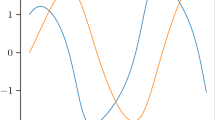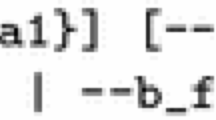Abstract
We analyse errors of randomized explicit and implicit Euler schemes for approximate solving of ordinary differential equations (ODEs). We consider classes of ODEs for which the right-hand side functions satisfy Lipschitz condition globally or only locally. Moreover, we assume that only inexact discrete information, corrupted by some noise, about the right-hand side function is available. Optimality and stability of explicit and implicit randomized Euler algorithms are also investigated. Finally, we report the results of numerical experiments which support our theoretical conclusions.




Similar content being viewed by others
Data availability
The datasets generated and analysed during this study are available from the corresponding author on a reasonable request.
References
Bochacik, T., Goćwin, M., Morkisz, P.M., Przybyłowicz, P.: Randomized Runge-Kutta method – Stability and convergence under inexact information. J. Complex. 65, 101554 (2021)
Daun, T.: On the randomized solution of initial value problems. J. Complex. 27, 300–311 (2011)
Eisenmann, M., Kovács, M., Kruse, R., Larsson, S.: On a randomized backward Euler method for nonlinear evolution equations with time-irregular coefficients. Found Comp. Math. 19, 1387–1430 (2019)
Heinrich, S.: Complexity of initial value problems in Banach spaces. Zh. Mat. Fiz. Anal. Geom. 9, 73–101 (2013)
Heinrich, S., Milla, B.: The randomized complexity of initial value problems. J. Complex. 24, 77–88 (2008)
Jentzen, A., Neuenkirch, A.: A random Euler scheme for carathéodory differential equations. J. Comp. Appl. Math. 224, 346–359 (2009)
Kacewicz, B.: Almost optimal solution of initial-value problems by randomized and quantum algorithms. J. Complex. 22, 676–690 (2006)
Kałuża, A., Morkisz, P.M., Przybyłowicz, P.: Optimal approximation of stochastic integrals in analytic noise model. Appl. Math Comput. 356, 74–91 (2019)
Kruse, R., Wu, Y.: Error analysis of randomized Runge–Kutta methods for differential equations with time-irregular coefficients. Comput. Methods Appl. Math. 17, 479–498 (2017)
Morkisz, P.M., Plaskota, L.: Approximation of piecewise hölder functions from inexact information. J. Complex. 32, 122–136 (2016)
Morkisz, P.M., Plaskota, L.: Complexity of approximating Hölder classes from information with varying Gaussian noise. J. Complex. 60, 101497 (2020)
Morkisz, P.M., Przybyłowicz, P.: Optimal pointwise approximation of SDE’s from inexact information. J. Comp. Appl. Math. 324, 85–100 (2017)
Morkisz, P.M., Przybyłowicz, P.: Randomized derivative-free Milstein algorithm for efficient approximation of solutions of SDEs under noisy information. J. Comp. Appl. Math. 383, 113112 (2021)
Novak, E.: Deterministic and Stochastic Error Bounds in Numerical Analysis, Lecture Notes in Mathematics, vol New York, Springer–Verlag (1349)
Parthasarathy, K.R.: Probability Measures on Metric Spaces. AMS Chelsea Publishing (2005)
Stengle, G.: Numerical methods for systems with measurable coefficients. Appl. Math. Lett. 3, 25–29 (1990)
Stengle, G.: Error analysis of a randomized numerical method. Numer. Math. 70, 119–128 (1995)
Traub, J.F., Wasilkowski, G.W., Woźniakowski, H.: Information-Based Complexity. Academic Press, New York (1988)
Werschulz, A.G.: The complexity of definite elliptic problems with noisy data. J. Complex. 12, 440–473 (1996)
Werschulz, A.G.: The complexity of indefinite elliptic problems with noisy data. J. Complex. 13, 457–479 (1997)
Acknowledgements
We would like to thank anonymous reviewers for many valuable comments and suggestions that allowed us to improve the quality of the paper.
Funding
This research was partly supported by the National Science Centre, Poland, under project 2017/25/B/ST1/00945.
Author information
Authors and Affiliations
Corresponding author
Ethics declarations
Competing interests
The authors declare no competing interests.
Additional information
Publisher’s note
Springer Nature remains neutral with regard to jurisdictional claims in published maps and institutional affiliations.
Appendix
Appendix
The following lemma can be proven in the same fashion as Lemma 1(i) in [1].
Lemma 2
Let \((\eta ,f)\in F^{{\varrho }}_{R_{2}}\), where
Then
-
(1) has a unique solution z = z(η, f) such that \(z\in \mathcal {C}^{1}\left ([a,b]\times \mathbb {R}^{d}\right )\) and z(t) ∈ B(η, R2) for all t ∈ [a, b];
-
there exist \(C_{1} = C_{1}(a,b,K)\in (0,\infty )\) and \(C_{2} = C_{2}(a,b,K,L)\in (0,\infty )\) such that for all t ∈ [a, b]
$$ \|z(t)-z(s)\| \leq C_{1} |t-s|, $$(42)$$ \left\|z^{\prime}(t)-z^{\prime}(s)\right\| \leq C_{2}|t-s|^{{\varrho}}. $$(43)
Next lemma is used to show existence and uniqueness of a measurable solution to the implicit randomized Euler scheme. Its proof can be found in [3] (Lemma 4.3).
Lemma 3
Let \(\tilde {\mathcal {F}}\) be a complete sub σ-algebra of the σ-algebra Σ, \(M \in \tilde {\mathcal {F}}\) with \(\mathbb {P}\left (M\right ) = 1\) and \(h\colon {\varOmega }\times \mathbb {R}^{d} \to \mathbb {R}^{d}\) such that the following conditions are fulfilled.
-
The mapping x↦h(ω, x) is continuous for every ω ∈ M.
-
The mapping ω↦h(ω, x) is \(\tilde {\mathcal {F}}\)-measurable for every \(x\in \mathbb {R}^{d}\).
-
For every ω ∈ M there exists a unique root of the function h(ω,⋅).
Define the mapping
where Q(ω) is the unique root of h(ω,⋅) for ω ∈ M and Q(ω) is arbitrary for ω ∈Ω∖ M.
Then Q is \(\tilde {\mathcal {F}}\)-measurable.
Rights and permissions
About this article
Cite this article
Bochacik, T., Przybyłowicz, P. On the randomized Euler schemes for ODEs under inexact information. Numer Algor 91, 1205–1229 (2022). https://doi.org/10.1007/s11075-022-01299-7
Received:
Accepted:
Published:
Issue Date:
DOI: https://doi.org/10.1007/s11075-022-01299-7
Keywords
- Noisy information
- Randomized Euler algorithms
- Explicit and implicit schemes
- n th minimal error
- Optimality
- Stability




